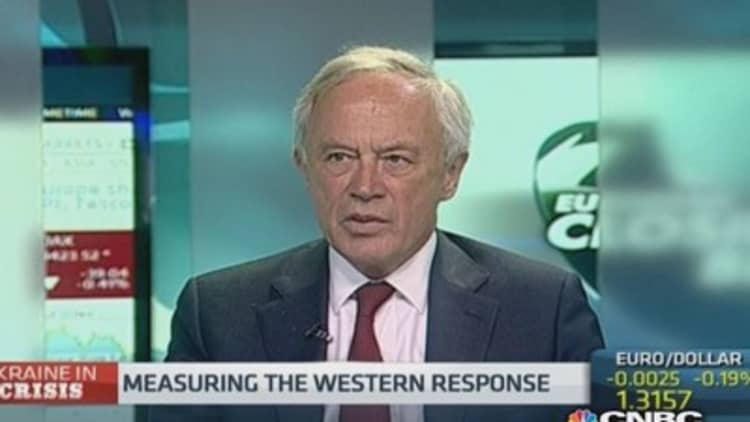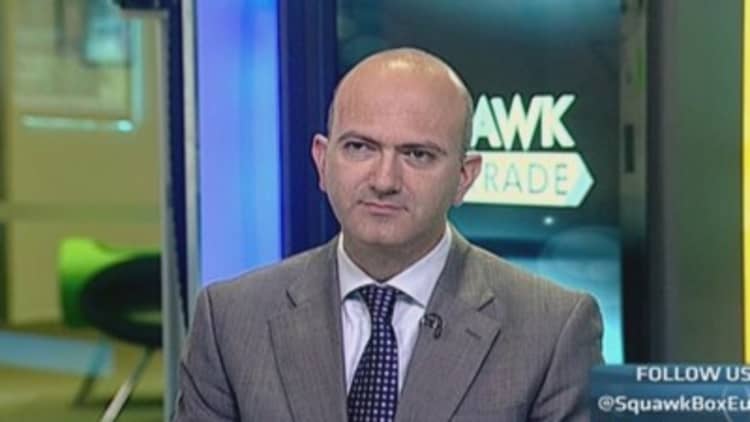The situation in Ukraine looks ever further from the peaceful, or at least contained, solution Western leaders were hoping for.
As Russia's territorial ambitions seemed closer to all-out war with its neighbor, Ukrainian President Petro Poroshenko canceled a planned trip to Turkey and President Barack Obama declared "Russia is responsible for the violence in eastern Ukraine." Markets were unsettled Thursday and Friday.
Ukraine on Friday called for full membership of NATO, according to Reuters, in its strongest plea yet for Western military help.
The International Monetary Fund approved $1.39 billion in aid to Ukraine on Friday.
Meanwhile, Reuters reported that Russian President Vladimir Putin had compared Kiev's drive to regain control of east Ukraine to the Nazi invasion of the Soviet Union in World War II. He told young people at a summer camp that Russia must be "ready to repel any aggression."

Despite the worrying rhetoric and developments, , some analysts of the region warned that markets were still underestimating the risk.
"Many people have been in denial for too long over Russian intentions towards Ukraine," Timothy Ash, head of emerging markets research at Standard Bank, said in a statement. "Another red line has been crossed, the only questions now are how the West responds."
The week started off with hopes for a rapprochement, as Poroshenko and Putin met in Minsk, Belarus, but ended with both sides more fiercely opposed than ever.
Read MoreStreet bets on limited Ukraine fallout...for now
Here are some of the reasons this conflict could escalate.
Russian boots, Ukrainian soil
NATO has confirmed that there are more than 1,000 Russian soldiers in eastern Ukraine, suggesting both that their influence has extended beyond the previous centers of conflict to the coastal town of Novoazovsk, and also that Russia is less and less concerned about concealing its active role in aiding the pro-Russian side in Ukraine's civil war. The "West will view Russia's actions as incursion, not invasion," according to Eurasia Group, but this increasingly seems a matter of semantics.

Putin's language
Putin's use of the term "Novorossiya" ("New Russia") to describe some currently Ukrainian land first surfaced in April. Once used to describe Russian-ruled lands gained during the 18th century wars against the Ottoman Empire, it is being used more and more, suggesting Russian ambitions for further annexations beyond Crimea.
Ukrainian elections
With new elections in October, Poroshenko will not want to look as though he is being soft on the rebels in the east, a criticism leveled at his predecessor Olexander Turchynov, or giving in to Russian influence. This will make the chances of conciliation even slimmer.
Read MoreUkraine may have an energy problem besides nat gas
Poland
With its recent memories of Soviet Union influence, Poland has been the most outspoken European country against Russia's actions toward Ukraine. This continued Thursday, with Foreign Minister Radoslaw Sikorski calling for "actions" against Russian "aggression."
Russian gas
The need for Russia's abundant natural gas supplies in Germany in particular has tempered the response to the crisis so far.
One of the ways Ukraine can put pressure on Russia's economy, and on European leaders to act, could be to refuse to transit Russian gas to Europe.
More sanctions
The possibility of further sanctions against Russia by the West appeared higher as Obama reiterated his German counterpart Angela Merkel's support for U.S. condemnation of the country. Germany, more reliant on Russian trade than any of its main EU counterparts, has been one of the main opponents of sanctions against Russia to date.
Read MoreRussia retaliates with sanctions: Winners and losers
If the situation seems to be approaching invasion rather than incursion, more severe sanctions are likely to follow.
—By CNBC's Catherine Boyle


